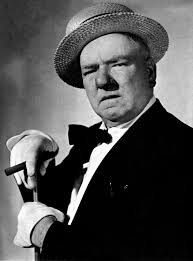Get Today in Masonic History into your Inbox. Sign up today for one of our email lists!
Need an article for your Trestleboard/Newsletter see our Use Policy
William Claude Dukenfield Passes Away

Today in Masonic History William Claude Dukenfield passes away in 1946.
William Claude Dukenfield (a.k.a. W. C. Fields) was an American comedic actor and entertainer.
Dukenfield, who I will refer to as Fields throughout this article, was born in Darby, Pennsylvania on January 29th, 1880. Fields had a volatile relationship with his father growing up and often ran away for short periods of time to live with his grandmother or with various uncles. At the age of twelve while Fields was working with his father the two had an argument and Fields ran away again. Later Fields found work in other places. Due to his often running away, Fields never made it past grammar school. He also later in life embellished his running away. He told stories of himself living on the streets with only his wits. Despite the repeated running away, Fields actually had a pretty good home life and his entire family, including his father were very supportive of him in his entertainment career. At one point his father traveled to England to see his son perform. Fields purchased a summer home for father and encouraged family members to read and write so they could keep in communication.
In 1898, Fields officially became W.C. Fields as his stage name. His early act was strictly juggling, which he had been already working on for years in local theaters and churches near his home. He almost never spoke in his early act, this was to conceal a stutter. By the early 1900's he was touring all over the world. When he played in front of English speaking audiences he, for show, added muttering to his act. He intentionally dropped balls and then muttered at it, like it was the ball's fault. This Fields he found gained him a great deal of laughs.
By 1905, Fields began appearing on Broadway in various comedic plays. He discovered he was at the point in his career where if he wanted to go forward he needed to start speaking on stage. In 1915, he became a regular with the Ziegfeld Follies. He appeared in the Follies until 1922.
Also in 1915, Fields began appearing in movies. Some of his first films were filmed in New York City because his Broadway schedule didn't allow him to travel to Hollywood. In the mid 1920's Fields left Broadway and began working in film. He worked in film until the 1940's when his drinking and health issues made studios reluctant to work with him.
Fields was interestingly a staunch atheist. At least one quote on this subject states he "regarded all religions with the suspicion of a seasoned con man," which may imply he was less of an atheist and more a person who was anti-religion. Fields was a studious man despite his lack of formal education, he had a library built into his house later in life. When caught once reading the Bible, he stated he was "looking for loopholes." Fields main focus of study was Theology. His membership in the fraternity implies his views changed, as many do, over his lifetime.
One of the most famous quotes attributed to Fields, "any man who hates dogs and babies can't be all bad" was actually not said by Fields. A humorist for Fields actually made the quote. The error just reinforced the idea many already had of him. He didn't like dogs or children. Fields actually loved to entertain children and often entertained the children of friends when they visited. He also responded to children who wrote him letters asking how to become a juggler after seeing some of his films or performances. He also owned several dogs.
Fields, a heavy drinker later in life, passed away on December 25th, 1946. It was a holiday he claimed to hate. He passed away from an alcohol-related gastric hemorrhage.
Fields was a member of E. Coppee Mitchell Lodge No. 605 in Philadelphia, Pennsylvania. He was raised on May 20th, 1907. He was suspended for non-payment of dues on December 16th, 1924.
This article provided by Brother Eric C. Steele.

